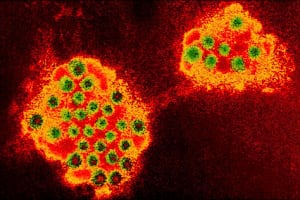Norovirus outbreak at Wolverhampton's New Cross Hospital triggers visiting restrictions
Norovirus has broken out at Wolverhampton's New Cross Hospital on at least one ward, prompting restrictions on visiting.

The virus, which causes diarrhoea and vomiting, has been confirmed on one ward, while tests on patients showing norovirus symptoms on a second ward are being carried out.
Royal Wolverhampton NHS Trust said neither ward was closed to new admissions, but restrictions on visiting and staff movement had been implemented.
No one was said to have been seriously unwell from the infection, and patient treatments were continuing as normal.
Wards C15 and C16 are affected.

A spokesman for the Trust said: "Members of the public are reminded that they must not visit the hospital if they have symptoms of diarrhoea or vomiting or until they have been symptom free for at least 48 hours."
"The patients on the affected wards and their relatives have been informed and assured that all necessary precautions have been put in place."
Dr Mike Cooper, the Trust's Director of Infection Prevention and Control, added: "We are aware that there are norovirus outbreaks and cases in the community at the moment.
"We hope that the early detection and our actions will prevent spread to other wards.
"Scrupulous hand hygiene by all staff and visitors and a high level of environmental cleanliness are the essential measures for controlling this bug.
"We have restricted the times of visiting and the number of visitors patients will be allowed to have on the affected ward, as this is a highly contagious disease.
"We hope that patients, relatives and carers understand the reasons for this restriction. Any visitors must decontaminate their hands properly before they leave the ward."
What causes Norovirus?
Norovirus is a virus which causes diarrhoea and/or vomiting and spreads like a cold or flu ('gastric flu') and is more common in the colder, winter months. It is also sometimes called 'gastric flu' and 'winter vomiting'. Outbreaks are common in the UK, including in hospitals, care homes and schools.
How will I know I have Norovirus?
People who have Norovirus have sickness and diarrhoea for about one- three days. They might also have a raised temperature, headaches and aching limbs. Although it can be unpleasant for the person affected, the illness is usually mild and will get better on its own. Antibiotics are not required, in fact as this illness is caused by a virus antibiotics will have no effect.
Why is Norovirus a problem?
Winter vomiting is very infectious and can be spread quickly through any close contact. In hospitals, large numbers of patients, visitors and staff can be affected. This can disturb the normal working of the hospital.
How can Hospitals prevent Norovirus?
When there are high levels of this infection in the community, it is very difficult to prevent patients, staff and visitors bringing the infection into hospital. When hospitals have one or more patients on a ward who have a suspected infection, they are careful to identify it early and take steps to prevent its spread (see below).
If I have had Norovirus recently, can I come into hospital?
Hospitals will always ask people who have an infection to 'leave it at home' by delaying coming into hospital until they are better. Anyone, including visitors, who is unwell or suffering from diarrhoea and vomiting should not visit hospital (including the food areas) until they have been free from symptoms for at least 48 hours.
If I have Norovirus, how will this affect my care whilst in hospital?
If you become unwell with Norovirus on the hospital ward, the ward staff will continue to provide care for you but also try to prevent other patients, visitors and staff from becoming infected. They might need to delay some planned investigations or operations until you are feeling better. Until you recover, you might be moved to a side room or an area in which other patients have the same illness.
What treatment will I have for Norovirus?
The most important thing we can do for you while you have symptoms is to make sure you have plenty of fluids as soon as you are able. Your doctor may ask you to provide a stool specimen to be tested for Norovirus and other conditions. If you are in hospital or another care setting a sample may be sent to confirm Norovirus.
How can I help to prevent the spread of Norovirus?
As stated above please do not come into hospital until you have been free of symptoms for at least 48 hours. If a visit is essential, please inform the staff before your arrival, if possible. If this is not possible then please tell them immediately on arrival. If you are not sure then please contact the hospital for advice.
Visits to your GP or other care providers should also be delayed until you have been free of symptoms for at least 48 hours. If you feel you need to see your GP please telephone the surgery first and explain your symptoms.
Hand Hygiene is the most important thing we can all do to prevent the spread of infection. For known Norovirus infection this should be done thoroughly with soap and water. Alcohol gels and rubs are not effective against this infection.





